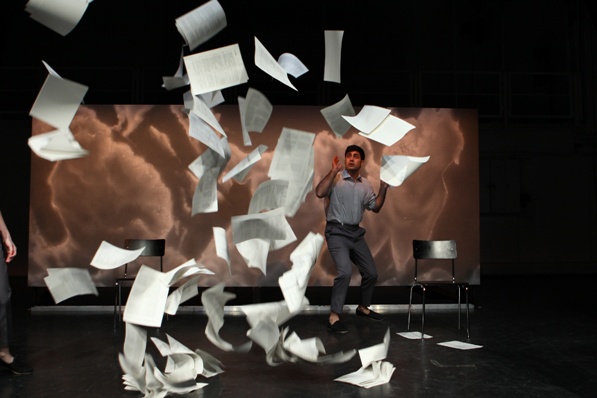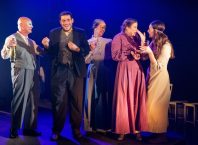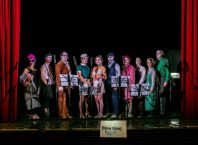
Family Ties is a long-term collaboration between Beit Lessin Theatre and the Heidelberg Municipal Theatre, launched at the Beit Lessin Open Stage Festival in 2009, to create a series of six plays with actors, writers, dramaturges and directors from both theatres. The project came to a close with two full productions and one staged reading at the recent 2011 Beit Lessin Open Stage Festival: Medicament, written by Maya Scheye and directed by Avishai Milstein; Peace Syndrome, a documentary theatre project written by Torge Kübler and the performers, and directed by Kübler; and My Father, written by Kristo Sagor, translated and directed by Avishai Milstein.
Of the three works, Medicament is perhaps the most traditional in respect to the dramatic genre, yet its performance at the festival was quite unusual: a play written in Hebrew by an Israeli playwright, translated into German by Sharon Nuni, and performed in Israel by a German cast – Axel Sichrovsky (Arie/Judah); Ute Baggeröhr (Anna); Jennifer Sabel (Lisa) and Klaus Cofalka-Adami (Christian). As I am not a speaker of German, I was obliged to make use of the Hebrew surtitles, which, in a rather text-heavy production such as this, was inevitably somewhat of a distraction.
Yet at the same time, given the play’s subject matter, hearing it performed in German by a German cast is an experience unto itself, yet another strange turn in the tangle of Israeli/German relationships. The play finds Arie Stein, a Jewish businessman specializing in medical patents, on the day of his father’s death. Arie’s estranged German wife Anna is a former student of his father, Judah Stein, scientist and Holocaust survivor. Exploring his father’s lab, Arie begins a journey into the mysteries of his father’s past.
The complex relationship between past and present, Germans and Jews is examined from the angle of science – and more specifically scientific ethics, a perspective that is not as prevalent in reflections on the Holocaust, and one that is worthy of further thought and discussion. The issues somewhat overpowered the drama, with certain scenes or characters tending too much to the general rather than the particular. Yet other dramatic choices served the play well, such as Axel Sichrovsky’s casting as both Arie and his father Judah, with subtle transitions between scenes in the present and scenes from Judah’s past creating a sense of ambiguity and uncertainty as past and present merge and dissolve one into another.
If Medicament takes place at a familiar, albeit painful junction of German-Jewish relations, looking back to the past and the Holocaust in a traditional dramatic framework; Peace Syndrome is a very different project that explores a contemporary theme with the tools of the moment: documentary theatre. The text was created from interviews conducted with Germans who volunteer in Israel and the Palestinian Authority, creating a collage of voices and perspectives. The volunteers are usually affiliated with NGOs: some work with the Action Reconciliation Service for Peace (ASF, founded in 1958 to acknowledge and make amends for the damage inflicted by Germany on other countries during WWII), some are involved with issues of the conflict, some volunteer as an alternative to military service (which was compulsory in Germany up until this year), some spend a year or two in the area, some remain and build a life in Israel.
Although the production is research based, it is not intended as a comprehensive overview of German volunteers in Israel, but rather as a work of theatre conveying the experience of a reality that is baffling, often painful, and sometimes funny. The four actors (Yuval Scharf and Amir Shoresh from Beit Lessin; Natanaël Lienhard and Matthias Rott from Heidelberg) are dressed for comedy in perfectly ironed button down shirts and knife pleat ironed cropped trousers in tasteful gray held up by suspenders. At one point in the play the volunteers are referred to ironically as “angels” able to fly back and forth over the wall between Israel and the Palestinian Authority, and the costumes by Harel Luz suggest a stylish flight attendant/angel hybrid. A strange yet alluring soundtrack of children’s voices opens the play, a huge heap of papers falls from the ceiling onto the actors and the floor – and the action, or rather talking begins.
Performed in Hebrew, English and German with surtitles, the experience of watching the play replicates to a certain extent the experience of being a stranger in a strange land. Yes, it’s hard to follow every word precisely, yet that does not detract from the play’s impact, perhaps the opposite is true. I emerged with a sense of the confusion many of these volunteers must feel, plunged into a complex situation difficult to penetrate and comprehend even for those born and raised here. The play offers some perspective on Israel and the Palestinian Authority as seen through the eyes of the volunteers, and also opens up questions in relation to the volunteers themselves. What are their motives for coming here? Are they doing something for humanity, or are their motives personal, perhaps even selfish; and maybe it’s ok to do something for one’s own purposes that also helps others.
The collage of languages, movement, music, mounds of papers, and multiple voices convey a sense of confusion that to my mind describes the current situation very precisely. If one remembers that the Family Ties project itself is also yet another German-Israeli project enhancing communication and cooperation between the two cultures, there is a rather satisfying dizzy sense of mise en abîme in viewing this entertaining and provocative play.
The staged reading of My Father offered some nice surprises, both in terms of text and performance. Avishai Milstein (Beit Lessin Artistic Director and theatre director) stepped in at the last minute to read the part of Shmuel, an Israel antique dealer and somewhat more than middle-aged lover of Anton (Amir Kriaf), born in Berlin and currently a lecturer at the Hebrew University in Jerusalem. Completing the triangle is Haled (Yossi Zabari), a Palestinian from East Jerusalem and Anton’s student. The talented trio delivered a very pleasurable performance that more than made up for the talking heads aspect of staged readings. While the political undercurrent is undeniable, the play’s focus is on the nuances of the relationships between the three men; a rarity in the realm of German-Israeli theatre projects, and perhaps an indication of future possibilities. It would be welcome to see this one as a full production.
Medicament by Maya Scheye, translation to German by Sharon Nuni, directed by Avishai Milstein, dramaturgy by Kerstin Grübmeyer, set by Gili Avisar, costumes by Diana Aman. Performers: Axel Sichrovsky, Ute Baggeröhr, Jennifer Sabel, and Klaus Cofalka-Adami.
Peace Syndrome by Torge Kübler and creative team, directed by Torge Kübler, artistic consulting by Ariel Nil Levy, dramaturgy by Jan Linders and Julia Reicher, set and costumes by Harel Luz. Performers: Yuval Scharf, Natanaël Lienhard, Matthias Rott, Amir Shoresh.
My Father by Kristo Sagor, translated and directed by Avishai Milstein. Performers: Avishai Milstein, Amir Kriaf, Yossi Zabari.





